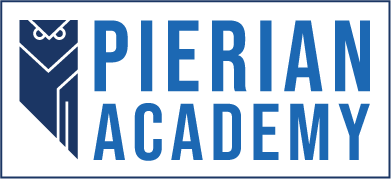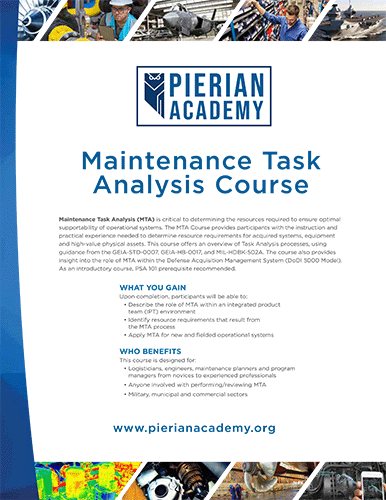Maintenance Task Analysis (MTA) Training
The Standard for Excellence
About MTA Training
Maintenance Task Analysis (MTA) training teaches the identification and documentation of all the logistics involved in the preventive maintenance and corrective maintenance of physical equipment and resources.
Maintenance Task Analysis begins by determining and analyzing all the chronological steps in a repair or maintenance process. Detailed instructions are then constructed for each step. A full MTA instruction process includes descriptions of who and how many people perform each task; a step-by-step narrative of the procedure; support and environmental equipment required; time duration of each step, spares, and parts necessary to complete the repair or maintenance.
After an MTA procedure is documented, it is tested to determine:
- Total time required from start to finish
- Training opportunities to ensure correct completion of the task
- Skill-level assessment
- Equipment or environmental factors that hinder the procedure
Considerations in Maintenance Task Analysis include safety and compliance procedures as documented from industry sources and statutory regulation.
The Goal
The Maintenance Task Analysis documentation platform standardizes procedures, identifies best practices, eliminates potential hazards, creates process efficiencies and is part of a comprehensive Supportability Analysis that includes RCM, LORA, and FMECA.
SAE GEIA-STD-0007 & SAE TA-STD-0017
(Society of Automotive Engineers)
The technical standard: Maintenance Task Analysis (MTA)
SAE GEIA-STD-0007 identifies the range of logistics product data elements that can be generated because of the supportability analysis conducted during the design, development, and initial fielding of a system, end item, or product. This standard designs and delivers a standardized definition of data elements or set of data tags for Logistics Product Data which is a subset of Product Support Analysis (PSA.)
SAE TA-STD-0017 establishes descriptions of activities which, when performed in a logical and iterative nature, comprise the Product Support Analysis (PSA) process.
What You Will Learn:
- How to detail the resources required in implementing corrective and preventive maintenance tasks effectively on equipment and systems
- Identifying every type of maintenance task within a system
- Thorough and complete documentation to capture the required resources and details for every type of maintenance task
- PSA disciplines as they relate to developing effective maintenance programs
- Theory and practical experience needed to implement and perform Maintenance Task Analysis
- Effective failure management strategies
- An understanding of MTA’s role within asset management
- Analysis of task intervals and tracking task elapsed times
Types of MTA Training
There is currently one course offering introductory Maintenance Task Analysis (MTA) training; it is intended for experienced logisticians and supportability professionals with a Product Support Analysis (PSA) prerequisite.
Attendees will be provided with the instruction and practice needed to apply Maintenance Task Analysis (MTA) to physical assets. This introductory course provides training designed to provide an understanding of MTA disciplines as they relate to developing effective maintenance programs. PSA 101 is strongly encouraged prior to attending this course.
For All Levels
MTA 101 • Fundamentals of Maintenance Task Analysis
Benefits of MTA Training
- An understanding of PSA disciplines as they relate to developing effective maintenance programs
- Theory and practical experience needed to implement and perform Maintenance Task Analysis
- Experience developing effective failure management strategies
- An understanding of MTA’s role within asset management
- Ability to identify opportunities that may warrant a more in-depth task analysis
Who is MTA for?
MTA is intended for experienced logisticians and supportability professionals.
- Fleet/asset managers
- Maintenance planners/managers
- Reliability managers/engineers
- Field service representatives
- Logisticians
- Maintenance technicians
- Supportability professionals
MTA Class Modules
MTA 101
Module 1 – Supportability in Design and Development
Module 2 – Supportability Late in Development & Early Production
Module 3 – Intro to Maintenance Task Analysis Process
Module 4 – LSA-056/LSA-019/LSA-024 Connection
Module 5 – Maintenance Planning Data Sources in O&S
Module 6 – Logistics Contracting
MTA Course Description
MTA Training 101
Fundamentals of Maintenance Task Analysis
An introduction to Maintenance Task Analysis (MTA) that provides participants with the instruction and practical experience needed to determine support resource requirements for acquired systems, equipment, and high-value physical assets. This course offers an overview of Task Analysis processes, using guidance from the GEIA-STD-0007 and the SAE-TA-STD-0017. The course also provides insight into the role of MTA within the Defense Acquisition Management System (DoD Instruction 5000). Intended for experienced logisticians and supportability professionals. (PSA 101 is recommended as a prerequisite)
Prerequisite: None
Course Duration: 3 Days
Cost: $999 per student

